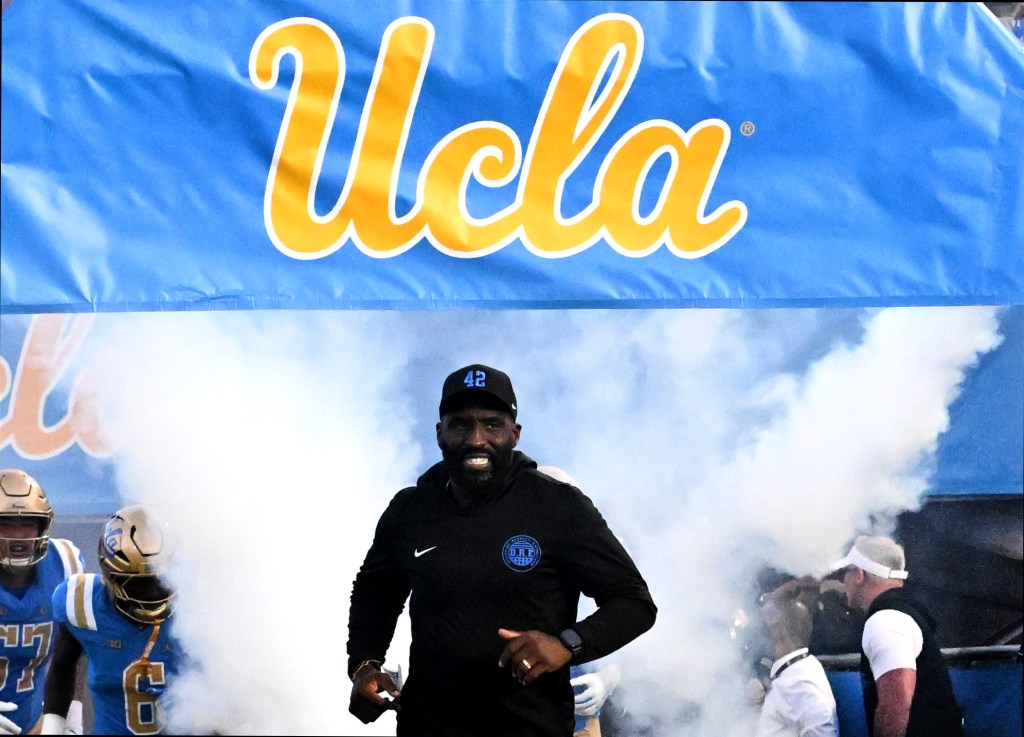
UCLA DeShaun Foster’s blip as a head coach of the UCLA football program is over already, thankfully, 15 games in.
Five wins, 10 losses, including all three games so far this season – stark affairs in which the Bruins were outscored by a combined 108-43. Results that laid bare how far behind the curve the Bruins’ program is entering Year 2 in the Big Ten Conference.
Foster’s hurried firing Sunday morning comes after his hurried hiring in February 2024, his placement a band-aid one week after Chip Kelly bolted to be offensive coordinator at Ohio State.
Putting Foster in charge was a big risk. He’d never been a head coach, never a coordinator. No one knew how well he’d recruit, what type of play-caller he’d be, or how well the introverted figure would do as a fund-raiser and lead representative of the program.
But everyone knew the former Bruins star running back loved UCLA, that he was stepping into a dream role. And that players loved him.
I thought, at the time, that it could count for something – or for more than it did, inevitably. I thought, hey, there could be a world where it would turn out to be worth the gamble for athletic director Martin Jarmond, especially without time on his side to make the pivot.
In hindsight, it’s pretty clear that if you’re picking a point man to steer a program as prestigious and prominent as UCLA’s, it’s better to pick a proven commodity.
UCLA’s head football coach is not the appropriate space to experiment. There isn’t time for grace; three good games and only three good games strung together didn’t do anything but fuel a flash of false hope.
No one at this level gets the benefit of training wheels or pool floaties, not when you’re diving directly into the deep end of college football. Not when you’re one of the new teams on the block in the Big Ten Conference. Not when the college athletic landscape is shifting under our feet, harder to master in many respects than ever before.
Not when a dream job can become a nightmare in the span of an awkward 15-second pause.
“I regret putting DeShaun in that situation where we were going into the Big Ten,” UCLA athletic director Martin Jarmond told reporters Sunday. “And even though we support it from a resource perspective, getting a start so late really disadvantaged his beginning to his coaching career here.”
Remember how his tenure began? With Foster freezing at his first Big Ten media day, a nationally panned gaffe for the face of a program with a mission of improving on Kelly’s 35-34 tenure.
Afterward, Foster made light of the media day moment and his supporters waved it off – insisted he’s here to coach football, not public speaking, as if a coach’s ability to mold a message isn’t a key to success. As if being fluent in coach speak isn’t mandatory for a major college football coach.
It felt, too often, that Foster was in over his head. From his debut at the helm, a too-close-for-comfort comeback, a 16-13 comeback victory at Hawaii, to his near media blackout in the run-up to his second season that made him look paranoid, as if the Bruins had something to hide.
And they did, is the gag. Foster and his staff were hiding a bad football team. Their squad first got demolished by Utah, 43-10 – the score not anywhere as “close” as Foster seemed to think after studying the film.
And then the Bruins followed up with consecutive losses to Mountain West Conference schools, 30-23 at UNLV and 35-10 to New Mexico, a 15.5-point underdog who UCLA paid $1.5 million to come kick the Bruins’ butts.
As of Friday night, Foster’s excusal was inevitable.
There was going to be no recovering from having other conferences mocking you on social media – the FCS Big Sky Conference making it clear they wouldn’t want UCLA, “No thank you,” and the Pac-12 using a sarcastic Jerry Seinfeld gif to state its position about the program that abandoned it in 2022: “That’s a shame.”
There wasn’t anything to point at on the field that might grant Foster a stay either, even temporarily. The Bruins’ uninspiring and slow-starting offense ranks 127th in the nation – despite the addition of high-profile transfer quarterback Nico Iamaleava.
The Bruins also are last in the nation – tied for 126th – in penalties, with 30 of them accounting for 275 yards. Give them a grade of an F for the “D” in Foster’s three-pillar approach D.R.E. (Disciplines, Respect, Enthusiasm).
No cavalry was coming; in fact, very few people were coming at all. The attendance at Friday’s game at the Rose Bowl was generously listed as 31,163. A free open practice there a few weeks ago drew a couple hundred people, many of them family and friends.
And the going is going to get only tougher, with the Bruins bracing for Big Ten collisions, including with No. 2 Penn State and No. 1 Ohio State.
There wasn’t anything to be done but to move on, hand the keys temporarily to Tim Skipper, who was serving as the special assistant to the head coach, give Foster his approximately $7 million buyout and try again to find a head coach who we know knows what he’s doing.
Someone who can walk the walk, talk the talk and pull a rabbit out of his hat with a Bruins program that’s disadvantaged in some ways by the fickle and competitive entertainment market that is L.A. and the unenviable task of running the Big Ten gauntlet against bigger-spending, more devoted football schools.
Somebody who won’t only have the chops to actually improve on Kelly’s mildly palatable recipe, but who can be counted on not to fumble scheduled victories like Foster’s final game on Friday.



